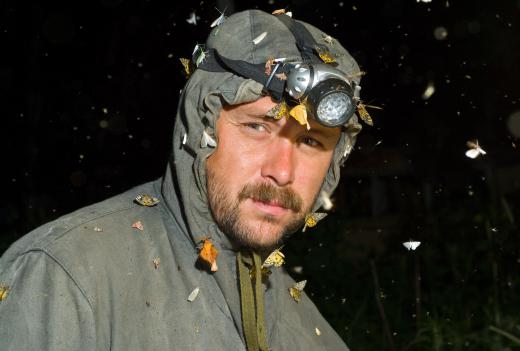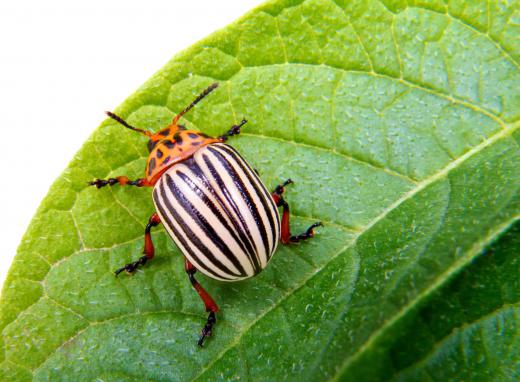What is Insect Ecology?
 Mary McMahon
Mary McMahon
Insect ecology is a field which focuses on the study of the interaction between insects and the environment. While laypeople may think of insects primarily in the form of irritating bugs like mosquitoes which ruin an evening barbecue, insects are actually very important to the natural environment, and they play a number of roles in the environment, from angel to villain. Several disciplines are brought together in insect ecology, including entomology, ecology, and microbiology.
Insects are a critical part of the circle of life in the environment. When animals and plants die, several important insect species start the process of breaking down the organic material so that it can be digested by even smaller bacteria and fungi. Insects also act as pollinators, ensuring the survival of plant species, and they can play a more menacing role as vectors for disease. Insects can even help in criminal investigations.

Researchers who work in the field of insect ecology study insect life and look at the normal balance of insects in a number of natural environments. Insect ecologists can identify disruptions in the environment by looking for unusual characteristics in insect populations, such as a very high number of mosquitoes, or suspiciously reduced numbers of bees. They also study the complex interconnected relationships between insects and the environment, and the ways in which insects actually build their environment, ranging from the massive termite mounds which can shape a landscape to evolutionary adaptations in plants which are designed to attract pollinators.

Insect ecology can include the study of insect behavior, the impact of human activities on insect populations and the ecosystem at large, the role of insects in human history, and what happens when insects are absent from an environment. Insect ecologists are also interested in issues like controlling dangerous insects, identifying and studying insects which carry disease, and the impact of introduced non-native insect species on the environment.

A lot of field work is involved in insect ecology, with researchers traveling to sites of interest to make observations and collect samples. Researchers also work in the lab, studying insects in controlled circumstances and conducting tests. Insect ecologists can work for government agencies, environmental organizations, and private companies, performing a variety of tasks from surveying insect populations in endangered ecosystems to helping pharmaceutical companies develop drugs which are designed to kill parasites in mosquitoes before they get a chance to enter the human body.
AS FEATURED ON:
AS FEATURED ON:














Discussion Comments
Personally I have always thought it was a shame that people didn't include insects in their diet more.
Insects are so easy to breed and make up such a large part of the ecology of the world, they would be cheap and nutritious food.
I mean, people in a lot of places do eat insects, sure. And things like scorpions and snails.
Plus people in the western world do eat insects because there are certain ingredients that are made out of insects (like red food dye).
I just think if we ate the locusts after they destroy the fields we'd be better off.
One of the lessons people are learning from studying insects is how efficiently the social insects like bees and ants use their resources.
They don't create any kind of mess, any kind of waste that isn't put back into the ecology and the environment. Even though there are far more ants than humans on the planet, for example, they are creating a much smaller environmental impact.
Humans could definitely learn from this, not just because it would make our current environmental disasters less severe but also because it would make sense in terms of money.
The more you can reuse and conserve your resources the more money you save.
I found this entomological site very useful to me. --M. Hanif
Post your comments